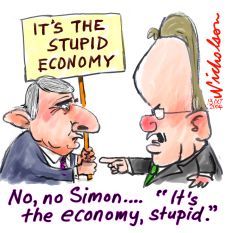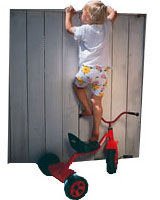Election Dark Horse: This Stupid Economy? genre: Econ-Recon & Six Degrees of Speculation

I've been watching an interesting trend as we approach the November midterm election. Approximately a month ago, there were cries from Republican leaning pundits for the President and his GOP cohorts to focus their message on the success of the U.S. economy. However, it appears that the economy may actually work against Republican candidates in many races...especially in states like Ohio.
I suspect that the record highs on the Dow Jones Industrial board may actually work against the GOP as it serves more as a symbol of the growing wealth divide that exists in the country and simply reminds struggling voters that wealthy Americans and corporations are profiting while jobs are being shipped overseas, pension funds are being endangered or abandoned, and the mainstay of their economic recovery, the housing market, is fading fast.
Bloomberg has a new article discussing the impact the economy may have on the midterm election.
Oct. 25 (Bloomberg) -- Democrats are getting a boost from voters on the big issues of the midterm congressional elections: the economy, the war in Iraq and unhappiness with President George W. Bush's leadership, according to a Bloomberg/Los Angeles Times poll.
With the elections less than two weeks away, the poll of voters in five battleground states shows voters with a moderate- to-strong preference for Democrats on most issues except terrorism, where Republicans still hold a small edge.
Majorities in each state -- Ohio, Virginia, Tennessee, New Jersey and Missouri -- disapprove of the job Bush is doing, and say the country needs to move in a new direction. Democrats score better than Republicans on handling the economy, taxes, gasoline prices and immigration.
The pro-Democratic tilt on issues "suggests that Republicans' troubles run much deeper than just a few swing states,'' said Amy Walter, an analyst for the Cook Political Report, a nonpartisan newsletter in Washington. "For Republicans hoping that their base and their voters rally in these last two weeks, it doesn't seem to be happening.''
Those who listened to the President's press conference this morning...billed to contain significant information on the Iraq war...heard George Bush simply reiterate the long held positions with regard to Iraq while tossing in words like adjust, react, respond to changing situations. Frankly, if this speech was intended to be the GOP pre-election pep talk, I'm afraid the team took a nap instead. Regardless, I took note of the President's effort to frame the election as being a referendum on two issues...national security (which party will keep the country safe and address the growing threats from extremists) and if you elect the Democrats they will raise your taxes and that is bad for the economy.
My first reaction was why would the President give a speech on Iraq to frame the election on everything but Iraq...but I digress. If I were a Democratic candidate, I would take the President's words and reframe them. I think Democrats can succeed if the simply tell voters that the GOP is hoping to disguise their numerous failures by extending two hollow offerings.
First, I would ask voters to consider whether the war in Iraq is bringing stability to the Middle East and therefore putting an end to the extremist ideology that seeks to attack Western Civilization. After we arrested and imprisoned the mastermind of the first trade center bombing in the early '90's but they returned in 2001...and we have yet to capture the person responsible for 9/11. We haven't been attacked for five years...but just what does that tell us about whether or not our adversaries (who grow in numbers daily) are planning future attacks? Are our efforts in Iraq distracting us from the real war on terror? I think that has to be a consideration... and raising that point places voter focus back upon the merits of the Iraq war.
Secondly, regarding the Bush tax cuts, the truth is that the average voter received a token reduction in taxes while assuming more national debt than under any prior president. The bottom line is that the country took out a loan to give more money to the wealthy...and that means the middle class (you and your children) will be paying back those loans for decades. We now have two economies in this country...one for the wealthy and one for everyone else. When George Bush talks about tax cuts, he's not talking to those Americans in the latter economy. I would point out to voters that they stand to lose far more of their hard earned money if the housing market continues to decline. A tiny fall in the price of homes will far exceed the minor tax savings that the average American received. The bottom line is that we need an economy that works for all Americans...and this administration isn't offering that to the voters.
Republicans are getting clobbered by voters on the question of which party can best handle the economy even as the stock market hits record highs, gasoline prices plunge and the unemployment rate stands at a five-year-low.
Voters in all five states said the economy is worse off because of the Bush's policies of the past six years. In New Jersey, 53 percent of respondents said worse, versus 26 percent who said better. In Missouri, the margin narrowed to 41 percent to 33 percent.
While a sharp reduction in gasoline prices -- down 83 cents a gallon since early August -- has boosted consumers' disposable income, Republicans haven't reaped a discernible benefit. Voters surveyed in all five swing states said Democrats would do a better job of dealing with high fuel prices, and several respondents said in interviews that they view the decline in prices as just a ploy to boost Republicans' chances on Nov. 7.
Republican candidates are having trouble making their charge that Democrats would hammer American families with new tax hikes stick.
Voters in Ohio, New Jersey, and Virginia say Democrats would do a better job handling taxes than Republicans. The two parties came in about even in Missouri and Tennessee.
While the national unemployment rate remains historically low, at 4.6 percent in September, it is higher in several of the battleground states, including New Jersey and Missouri. Ohio, with a 5.2 percent unemployment rate, has lost 152,000 non-farm jobs since Bush took office in January, 2001. While some new jobs were added in the service sector, about 195,000 manufacturing jobs disappeared during that period.
Looking at the overall poll results, "the message that it's all the Republicans' fault and that Democrats deserve a chance to do better is working,'' said Stuart Rothenberg, publisher of the Washington-based Rothenberg Political Report.
The prevailing argument against this President and the GOP is that their actions have done little for the vast majority of Americans...they are out of touch with the issues that impact average citizens...yet they have placed the burden of their policies squarely on the backs of these hard working Americans. It is the middle class that must compete with the outsourcing of jobs, it is they who will bear the burden of a failing housing market, it is they and their children who will have to pay off the national debt and it is their sons and daughters who are giving their lives in a war that is likely increasing the threat to the homeland.
It is time that voters reject the GOP's hollow and wholly insufficient offerings and promises of a brighter future being waved as enticements just days before this election. We simply cannot afford to continue with this smoke and mirrors government.
Daniel DiRito | October 25, 2006 | 10:06 AM |
link
| Comments (1)
![]()
![]()
